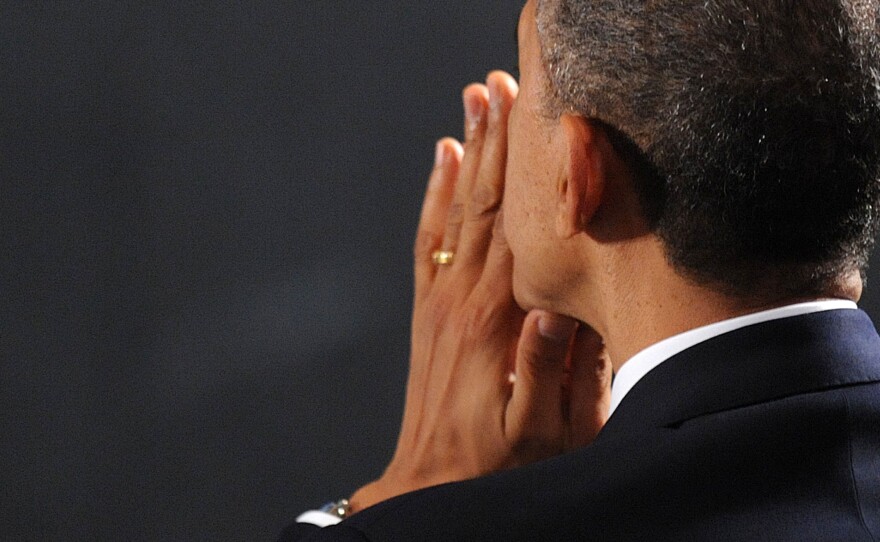President Obama is losing his patience when it comes to the country's gun laws. Speaking Thursday following a deadly shooting in Oregon, he sounded aggravated as he blasted Congress for not doing more to pass stricter gun legislation.
In an interview with the BBC earlier this summer, he called gun policy "one area where I feel that I've been most frustrated and most stymied."
"It is the fact that the United States of America is the one advanced nation on Earth in which we do not have sufficient common-sense gun-safety laws," Obama said, "even in the face of repeated mass killings."
He has felt less restrained and more empowered to go it alone on several issues as he nears the end of his time in office — issuing executive actions on immigration and Cuba. But on guns, he seems resigned that Congress is unlikely to do anything, and there isn't much he can do through executive action — though Obama said he's asked his team to see if there might be a path there, NPR's Tamara Keith reported.
Listening to his remarks after several significant shootings in his tenure, it's apparent that Obama's tone has become more forceful and frustrated, especially after the Sandy Hook Elementary School shooting, and failed attempt to pass legislation in Congress.
1) A 2009 shooting at Fort Hood in Texas that killed 13 was one of the first mass shootings of Obama's tenure. In remarks after and at a memorial service for the victims, Obama acknowledged the bravery of survivors and offered his thoughts and prayers to the victims' families. He made no reference to gun legislation:
2) Just over a year later, 13 people including Congresswoman Gabby Giffords were wounded in a Tucson, Ariz. shooting that left six dead. Obama acknowledged a national focus on guns, but called for those conversations to happen "with a good dose of humility":
3) In July 2012, Obama was on the campaign trail when 12 people were killed at a movie theater in Aurora, Colo. He held a moment of silence at his Florida event and spoke about the fragility of life, leaving politics mostly out of it:
4) The conversation around gun control reached a fever pitch just after Obama was reelected at the end of 2012. That's when 26 people were killed at Sandy Hook Elementary School in Newtown, Ct., including 20 children. Saying "these children are our children," Obama called on the country to "take meaningful action" on gun legislation:
5) And for a while, it looked like Obama might get his way but in April 2013 a bipartisan bill that would have expanded background checks for firearms purchases failed to pass in the Senate:
6) This summer, Obama again offered his condolences after a shooting — this time for the Emanuel A.M.E. church in Charleston, S.C. massacre that killed the pastor and eight others. But this time, unlike pre-Newtown, he immediately went to the politics, calling on Americans to "come to grips" with the issue of gun violence:
7) Most recently, Obama spoke Thursday evening following the Umpqua Community College shooting in Oregon that killed nine earlier that day. He spent the majority of his 12-minute remarks calling for "common-sense gun safety laws." He said he would continue to bring the issue up and that "each time this happens I am going to say we can do something about it."
Copyright 2015 NPR. To see more, visit http://www.npr.org/.






